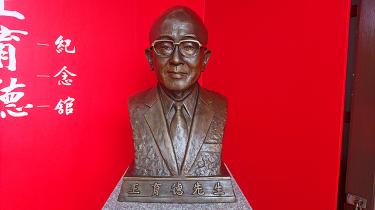A museum dedicated to independence activist Ong Iok-tek (王育德) yesterday opened at his former residence in Tainan, where he lived with his elder brother Ong Iok-lim (王育霖).
Born in 1924, Ong Iok-tek was a spiritual leader and forerunner of the Taiwanese independence movement in Japan. He was also an expert on the Hoklo language (commonly known as Taiwanese).
Ong Iok-lim, who was born in 1919, was the first Taiwanese prosecutor in the Japanese Empire.
After World War II, he returned to Taiwan and served as a prosecutor in Hsinchu City, but resigned after investigating then-Hsinchu mayor Kuo Shao-tsung (郭紹宗) for corruption.
Ong Iok-lim was killed during the 228 Incident in 1947.
In 1949, Ong Iok-tek fled to Japan through Hong Kong with only one suitcase in hand.
In 1960, while in Japan, he founded the Taiwan Youth Society, a political group that published a magazine titled Taiwan Youth (台灣青年).
In 1969, he received a doctorate from the University of Tokyo for his studies on Hoklo, becoming the first person to do so.
In 1974, he began campaigning for the rights of Taiwanese who had served in the Japanese military during the Japanese colonial era, but died of a heart attack in 1985, at the age of 61, before he could see the result of his efforts.
In 1986, the Japanese government passed a resolution to pay ¥2 million (US$18,017 at the current exchange rate) to each of the families of the Taiwanese soldiers who were killed in combat or to survivors who had been severely injured.
In 2002, Avanguard Publishing House published the complete works of Ong Iok-tek in Chinese.
Originally written in Japanese, Taiwan: A History of Agonies (台灣 — 苦悶的歷史), which has also been translated into English, is one of Ong Iok-tek’s most important works and is made up of 15 volumes.
Ong Iok-tek’s 93-year-old wife, Wang Mei-hsueh (王雪梅), daughter Wang Ming-lee (王明理) and granddaughter Aya Kondo, as well as other family members, traveled from Japan to attend yesterday’s plaque hanging and opening ceremony at the museum.
Several Japanese reporters were also present.
Many of Ong Iok-tek’s personal belongings are exhibited at the museum, including the suitcase he carried when he fled Taiwan, his report cards from school, photographs, manuscripts and clothing.
Source: Taipei Times - 2018/09/10





















